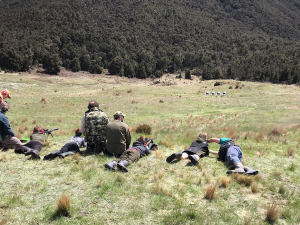Competition snares over 33,000 wild goats
The National Wild Goat Hunting Competition has removed 33,418 wild goats over the past three years.
 The New Zealand Deerstalkers Association (NZDA) wants the Government to put more focus on firearms education and safety.
The New Zealand Deerstalkers Association (NZDA) wants the Government to put more focus on firearms education and safety.
Five hunting-related shootings this year is prompting a call to review firearm safety training for licencing.
The New Zealand Deerstalkers Association (NZDA) wants the Government to put more focus on firearms education and safety.
It also wants the Police Minister Mark Mitchell and Associate Minister of Justice (Firearms) Nicole McKee to consider breaking the current monopoly on. Police currently outsource the firearms safety course to one contractor.
“It is time for the government to review the firearms training and education system and invest in the safety of New Zealanders in the same way that they prioritise water safety to save lives,” said Gwyn Thurlow, NZDA chief executive.
"Most people would assume, like driver licencing, that there are many ways and options to obtain a licence and attend a course, but that is not the case. A single contractor delivers it, which means it does not meet the community's needs nor the demand for new licencing."
Thurlow also expressed deep concern upon hearing of two incidents in as many days this week.
“There have been five hunting-related shooting incidents this year resulting in deaths or injury, and we are deeply concerned about this trend.”
“Our deepest sympathies go to the families and communities affected.”
All the incidents involved the discharge of a firearm where one or more of the seven basic rules of firearms safety had clearly been broken, including misidentification of the target and not pointing a firearm in a safe direction.
“These preventable incidents are extremely tragic and show that there is a need for the government to invest in firearms education and proper practical training for those who apply for a firearms licence.”
For many of our rural communities and smaller towns, there is no, or limited, provisional access to licencing. When a person gains a licence, there are no shooting ranges that can be accessed where firearms can be sighted-in and used under supervision in a ballistically safe and purpose-designed facility.
“The only option for new licence applicants is to travel to the main centres where firearms licencing courses are exclusively delivered. These courses are limited to classroom sessions and safety theory based, with no practical component,” says Thurlow.
“Often there is a long waiting list for people wanting to obtain a licence, and people are forced to delay licencing because they find the courses fully booked weeks in advance.
“The current system cannot satisfy the demand. As a result, too many people are choosing to remain unlicenced, and therefore increase the risk to other hunters and the public when unlawfully using firearms to hunt, just to put food on the table.”
Mike Spray, NZDA’s national programme manager HUNTS and former mountain safety council firearms instructor notes that most of its hunter training courses now include trainees without licences.
The NZDA national hunter education programme (HUNTS) teaches approximately 450 students a year to use firearms safely and responsibly, and to hunt ethically to feed their families.
Spray added, “Whilst the HUNTS course focuses on the safe use of firearms and hunter education, we are not able to provide credit for the firearms handling and live-fire educational component towards licencing.”
“This is even though our classroom sessions on firearm safety are taught, in many cases, by formerly approved instructors (before Police restructured licencing) and go beyond the current regime by teaching students practical skills to shoot safely on ranges and in the field. This should be considered more than adequate for the licensing process.”
In New Zealand, it is the clubs that provide live fire and hunter training because the government does not offer this service. There are also private groups that provide a good service, but that is costly and limited to a few participants a year, but the system needs to cater to the demand of nearly 8-10,000 new firearm licence holders annually.
Spray said that “if easy and affordable access to firearms licencing and ranges where Kiwis can practice their skills were available in all our communities, then this would go a long way to ensuring all firearms users had received firearms safety education and in turn minimise the risk of these unwelcome and avoidable incidents.”
“If the Government is serious about public safety around firearms, it is time they do so with more than words and commit financial support to save lives.”
Fonterra’s impending exit from the Australian dairy industry is a major event but the story doesn’t change too much for farmers.
Expect greater collaboration between Massey University’s school of Agriculture and Environment and Ireland’s leading agriculture university, the University College of Dublin (UCD), in the future.
A partnership between Torere Macadamias Ltd and the Riddet Institute aims to unlock value from macadamia nuts while growing the next generation of Māori agribusiness researchers.
A new partnership between Dairy Women’s Network (DWN) and NZAgbiz aims to make evidence-based calf rearing practices accessible to all farm teams.
Despite some trying circumstances recently, the cherry season looks set to emerge on top of things.
Changed logos on shirts otherwise it will be business as usual when Fonterra’s consumer and related businesses are expected to change hands next month.

OPINION: Here w go: the election date is set for November 7 and the politicians are out of the gate…
OPINION: ECan data was released a few days ago showing Canterbury farmers have made “giant strides on environmental performance”.